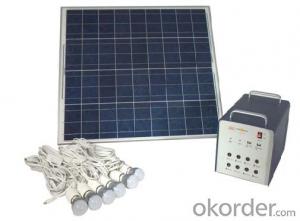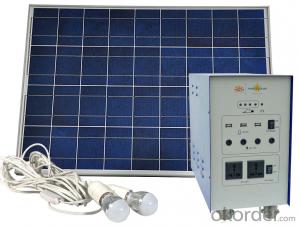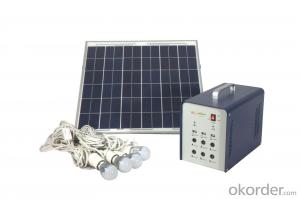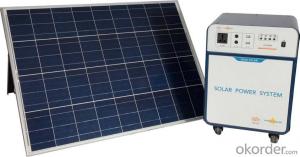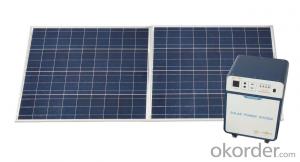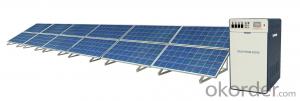Solar Energy Systems Brampton Home Off-Grid Solar Power System DC Lighting JS-SPS-300C
- Loading Port:
- Tianjin
- Payment Terms:
- TT OR LC
- Min Order Qty:
- 10 set
- Supply Capability:
- 10000 set/month
OKorder Service Pledge
Quality Product, Order Online Tracking, Timely Delivery
OKorder Financial Service
Credit Rating, Credit Services, Credit Purchasing
You Might Also Like
Off-grid Solar Power System
General Introduction
Solar power system provides alternating current and direct current, which is produced by the modules transforming solar power into power, to home lighting, household appliance and other DC appliance, such as cell phone and laptop.
Solar power system is widely used in area lack of power, for example house power supplying, monitoring, communication base, fire prevention in forest area, pasture and meadow, aquaculture etc.
We are dedicated to provide high quality off-grid PV products and systems to customers and has received a series of certificate, including ISO9001, TUV, UL, CE, CQC and RoHS.
Solar DC Lighting System
Multiple protection system, safe and reliable performance.
Integrated and portable design, easy operation.
DC5V, DC12V, AC220V output, wide range application.
Clean engergy, cycle use.
General Introduction
Solar power system provides alternating current and direct current, which is produced by the modules transforming solar power into power, to home lighting, household appliance and other DC appliance, such as cell phone and laptop.
Solar power system is widely used in area lack of power, for example house power supplying, monitoring, communication base, fire prevention in forest area, pasture and meadow, aquaculture etc.
We are dedicated to provide high quality off-grid PV products and systems to customers and has received a series of certificate, including ISO9001, TUV, UL, CE, CQC and RoHS.
Solar DC Lighting System
Multiple protection system, safe and reliable performance.
Integrated and portable design, easy operation.
DC5V, DC12V, AC220V output, wide range application.
Clean engergy, cycle use.
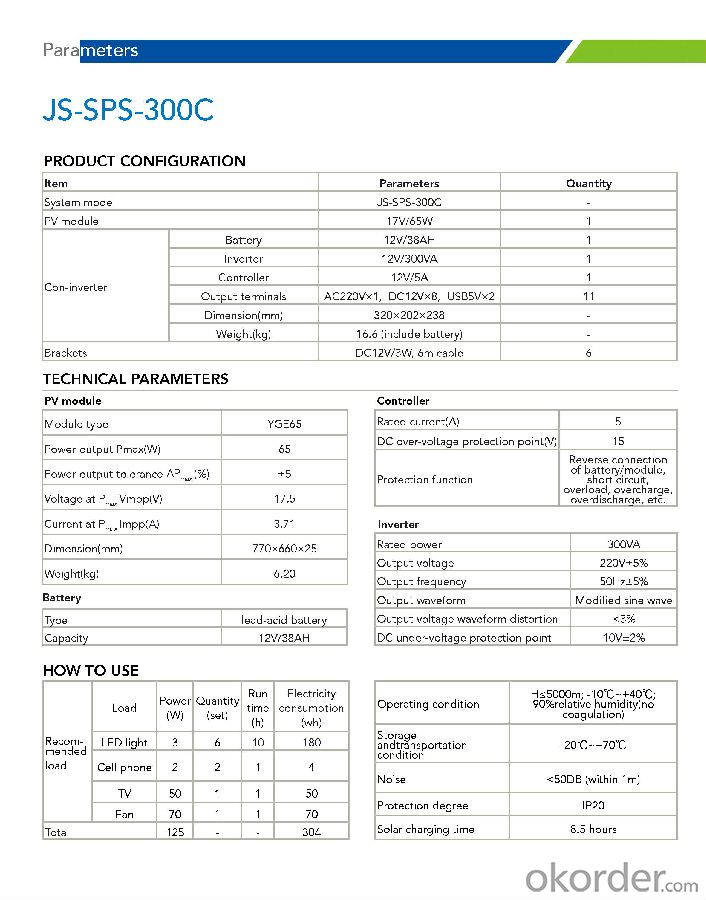
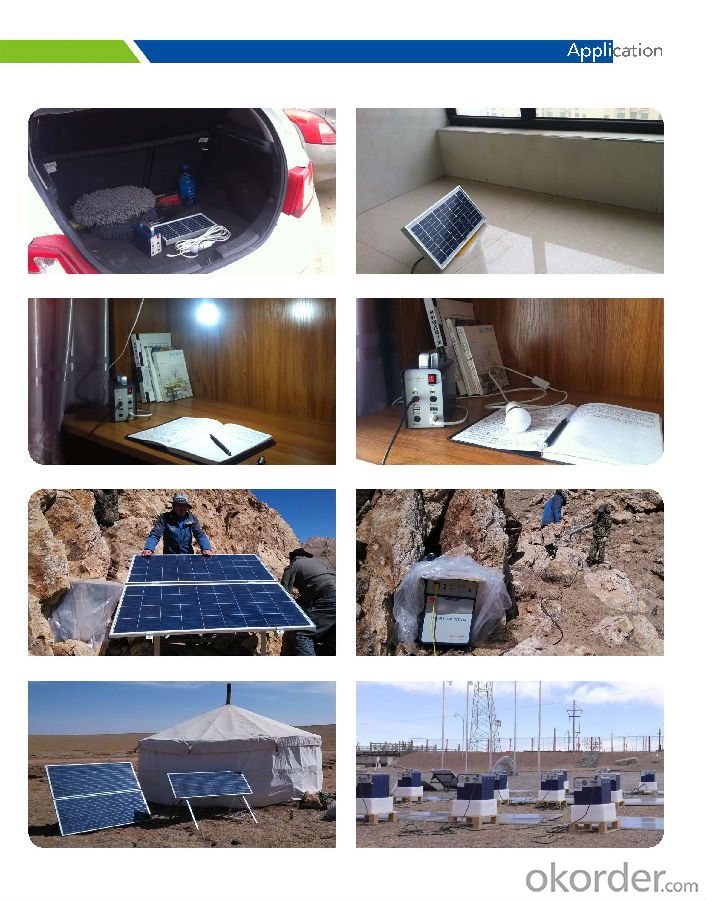

- Q: Do solar energy systems require planning permission?
- Planning permission is usually necessary for solar energy systems. The rules for obtaining planning permission can differ depending on the jurisdiction. In many instances, if you want to install solar panels on your residential property, you'll need to get permission from the local planning authority. This is important to ensure that the installation meets building codes and other regulations. Large-scale solar projects and commercial installations may also require planning permission due to their potential impact on the surrounding environment and infrastructure. To find out the specific requirements and steps for obtaining planning permission in your area, it's crucial to consult with the local planning authority or a professional solar installer.
- Q: How does the installation of solar panels affect the roof's warranty?
- The installation of solar panels typically does not void the roof's warranty. However, it is important to consult with the roofing manufacturer and installer to ensure that the installation process does not breach any warranty conditions.
- Q: How much space is required for installing a solar energy system?
- The space required for installing a solar energy system depends on various factors such as the capacity of the system, type of solar panels used, and available sunlight. Generally, for a residential system, an area of around 100-400 square feet is sufficient. However, larger commercial or utility-scale systems may require several acres of land. It is recommended to consult with a solar installer or engineer to determine the exact space requirements for a specific solar energy system.
- Q: What is the role of trackers in solar energy systems?
- Trackers in solar energy systems are responsible for increasing the efficiency and performance of solar panels by aligning them with the sun's position throughout the day. These devices track the sun's movement and adjust the angle and position of the panels to maximize the amount of sunlight they receive, ultimately generating more electricity and increasing the overall energy output of the system.
- Q: What is the impact of snow cover on the performance of solar panels?
- The impact of snow cover on the performance of solar panels is generally negative. Snow covering the surface of solar panels reduces the amount of sunlight that can reach the photovoltaic cells, leading to a decrease in electricity generation. It also hampers the self-cleaning mechanism of the panels, which relies on rainwater to wash away dirt and debris, further reducing their efficiency. However, advancements in solar panel technology, such as anti-reflective coatings and tilted mounting systems, have been developed to mitigate the effects of snow cover and improve performance during winter months.
- Q: Solar power generation system suitable for home, how much is the cost of a set?
- Then the 1000 Watt Solar panel price is 5000 yuan -10000 yuan, regardless of inverter and power generation, but with the power of the household appliances related to property, if you use ordinary household appliances 100 watt power inverter, then with a 300-500 tile, if you are using a blender or high power desktop computer although only 100 watts -200 watt but starting current, so the best 1000 Watt inverter. The price of the inverter is 800-2000 yuan (depending on the power and performance price).
- Q: Can solar energy systems be used in powering amusement parks?
- Certainly, amusement parks can utilize solar energy systems to power their operations. In recent years, solar power has gained popularity due to its numerous advantages. The energy requirements of amusement parks are substantial, as they need power for rides, lighting, and other facilities. By incorporating solar energy systems, parks can decrease their reliance on conventional energy sources and significantly reduce operational expenses. To harness the sun's power, solar panels can be installed on amusement park rooftops, parking lots, or open areas. These panels convert sunlight into electricity, which can be directly used to power various park activities. Moreover, any excess energy produced during peak sunlight hours can be stored in batteries for use during cloudy or nighttime conditions. The benefits of employing solar energy in amusement parks are extensive. Firstly, solar energy is a renewable and sustainable source, which means it does not deplete natural resources or emit harmful substances. This makes solar energy an environmentally friendly choice that aligns with the growing focus on green initiatives and carbon footprint reduction. Furthermore, solar energy systems offer a stable and predictable power source. Amusement parks often experience high energy demands during busy periods, such as weekends or holidays. Solar panels can easily handle these fluctuations and ensure a consistent power supply, minimizing the risk of power outages or interruptions. Additionally, the installation of solar panels can enhance the overall image and brand of an amusement park. By showcasing a commitment to sustainable practices, parks can attract environmentally conscious visitors and differentiate themselves from competitors. This can contribute to a positive public perception and potentially increase visitor numbers. In conclusion, solar energy systems are undeniably suitable for powering amusement parks. Their ability to generate clean, reliable, and cost-effective electricity makes them an ideal solution for meeting the energy requirements of amusement parks. By harnessing the sun's power, parks can reduce their carbon footprint, decrease operational costs, and enhance their overall appeal to visitors.
- Q: Can solar energy systems be used for powering remote weather stations?
- Yes, solar energy systems can definitely be used for powering remote weather stations. Solar energy is a clean and renewable source of power that can be harnessed in remote areas where connecting to the electrical grid might not be feasible or cost-effective. Weather stations require a continuous supply of electricity to operate their sensors, data loggers, communication devices, and other equipment. Solar panels can be installed at these stations to capture sunlight and convert it into electricity through photovoltaic technology. This electricity can then be stored in batteries, providing a reliable and sustainable power source for the weather station even during cloudy or nighttime conditions. Additionally, solar energy systems require minimal maintenance and have a long lifespan, making them ideal for remote locations where regular maintenance visits may be challenging. Overall, using solar energy systems for powering remote weather stations is a practical and environmentally friendly solution that can ensure the continuous operation of these vital monitoring facilities.
- Q: What is the impact of lightning on the performance of solar panels?
- The impact of lightning on the performance of solar panels can be significant, but it is relatively rare. Lightning strikes can cause damage to the physical structure of the solar panels, such as shattering the glass or damaging the wiring. This can lead to reduced or even complete loss of power generation from the affected solar panel. Moreover, lightning can also cause electrical surges that can damage the inverter, which is a crucial component of the solar panel system responsible for converting the direct current (DC) electricity generated by the panels into alternating current (AC) electricity for use in homes or businesses. If the inverter is damaged, it can result in a complete shutdown of the solar panel system until repairs or replacements are made. To mitigate the impact of lightning on solar panels, there are several protective measures that can be taken. One common approach is to install a lightning protection system that includes lightning rods or conductive paths to direct the electrical discharge safely into the ground. This helps to prevent lightning strikes from directly hitting the solar panels and reduces the risk of damage. Additionally, surge protectors can be installed to safeguard the inverter and other sensitive electronic components of the solar panel system. These surge protectors help to divert excess electrical energy from lightning strikes away from the system, protecting it from potential damage. Although lightning strikes can pose a risk to the performance of solar panels, it is important to note that modern solar panel systems are typically built to withstand extreme weather conditions, including lightning. Manufacturers often subject their panels to rigorous testing to ensure their durability and resistance to lightning strikes. Overall, while the impact of lightning on solar panels can be disruptive and costly, implementing proper protective measures can help minimize the risk and ensure the long-term performance and reliability of the solar panel system.
- Q: Can solar energy systems be used in disaster-stricken areas for emergency power supply?
- Yes, solar energy systems can be used in disaster-stricken areas for emergency power supply. Solar panels can generate electricity from sunlight, making them a reliable and renewable energy source even when traditional power grids are damaged or inaccessible. Solar energy systems can provide essential power for lighting, charging devices, running medical equipment, and other emergency needs, helping to alleviate the impact of disasters and support relief efforts.
Send your message to us
Solar Energy Systems Brampton Home Off-Grid Solar Power System DC Lighting JS-SPS-300C
- Loading Port:
- Tianjin
- Payment Terms:
- TT OR LC
- Min Order Qty:
- 10 set
- Supply Capability:
- 10000 set/month
OKorder Service Pledge
Quality Product, Order Online Tracking, Timely Delivery
OKorder Financial Service
Credit Rating, Credit Services, Credit Purchasing
Similar products
Hot products
Hot Searches
Related keywords
